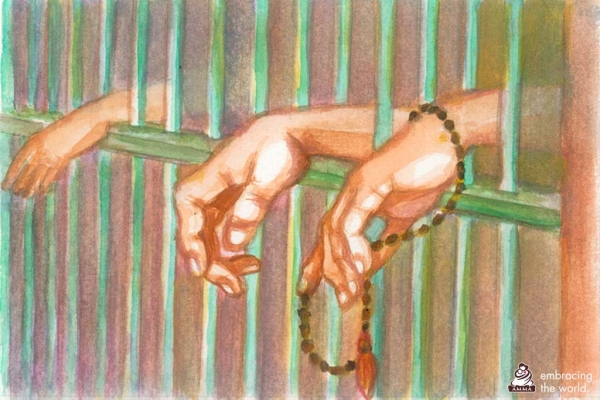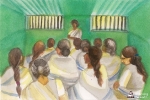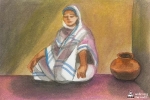Whatever the case may be, there is usually a sociological context where the people who commit crimes, especially murder, have lost a sense of the real purpose of life. Their peace of mind has evaporated and they do not know how to connect to the greater good.
Still, there are prisoners who, when a chance comes, feel inspired to find mental and physical healing. In collaboration with state and local governments, we have traveled to prisons and jails across India to teach thousands of inmates Amrita Yoga and Integrated Amrita Meditation Technique (IAM).
The largest initiative is in Kerala where instructors have reached out to more than 50 institutions, including central prisons, district prisons, sub-jails and special sub-jails spread across the state. Training sessions have also taken place in Tamil Nadu, Haryana and Punjab.
Five of our teachers share their experiences:
Brahmacharini Preethi
On the third day of a session in Kerala, an inmate cried throughout class and as soon as it finished, he came and shared his story. He had made a big mistake in life. During his tenure as president of a temple committee, members got into an argument, and upon leaving the meeting, he remained upset.
When he arrived home, his wife argued with him over a trivial matter, and he could no longer control his anger. He grabbed the nearest object and struck her so forcefully, she died due to the blow. He was convicted, sent to prison, and both of his children became orphans.
The man has been in prison for 13 years, and his mother takes care of the children. He is able to work there to earn ₹7,000 per month to send home, but his mother is ill and bedridden. He doesn’t know whether his children will be able to continue their schooling. He tearfully asked me to pray for his early release so that his children's future will not be ruined.
This prisoner is one of many I have met in these places where people who have been abused have acted out and are now drenched in grief. But I am also seeing the positive changes yoga and meditation bring to them.
Annual reports from the jails and prisons state that almost a year after starting their yoga practices, regular participants have lower rates of diabetes, blood pressure, cholesterol and depression. The lifestyle and attitudes of the inmates have changed because they have found a way to reveal the pain and remorse tied up in their hearts.
Brahmacharini Swapna
Three of us women went to a sub-jail for men in the Ernakulam district of Kerala. The warden warned us saying, “The people here are not your usual prisoners, but the most notorious criminals in the state. You need to be careful. You can decide if you want to teach the class or not.”
We replied, “It’s a government decision, so we will definitely teach the class.”
The warden went to each cell telling the prisoners that only those interested in learning yoga should come out and take part. To our surprise, no one came. The warden decided to announce the call more strictly, and about 30 prisoners arrived, though very angry as they were forced to participate.
But instead of being afraid, I was completely transformed. I looked straight into their eyes and spoke to them lovingly. Initially they were not ready to cooperate, but after a while, everyone became silent and started to listen carefully.
I felt the difference in their facial expressions and started with yoga asanas followed by meditation. At the end, I saw their faces turn from the initial looks of anger to expressions of gratitude in their eyes. They told me that they felt peaceful and some of their burdens were removed from their hearts.
On another occasion, a prisoner remarked, “I have been to all religious centres of India but no God has heard my prayers. I never received peace from anywhere. Through this class, I could feel a peace and happiness which I have never experienced before.”
This has been expressed by many of the prisoners. We all know that the inmates of jails are the ones who suffer the most in life. If we can give them peace of mind - even just for a moment - that also brings good will to us and illumines our path.
Brahmacharini Smiji
One day, Amma called me to the stage where she was giving darshan. My heart was beating fast as I went to her, but when I heard her words, it stopped beating altogether.
“A few among you should go and teach yoga in jail. There are many very sad prisoners there. You must go and speak words of peace and solace to them,” she instructed.
In many of Kerala’s jails for men, women have never entered the inner halls and corridors, so Amma’s assignment was a surprise for me as a female yoga teacher. Some of the convicts have committed extremely heinous, cruel acts.
The first time we arrived at a prison, even the police seemed afraid for our safety as they allowed the prisoners inside the training hall. But I did not feel any fear. I have always felt the strong presence of Amma with me.
During a feedback session in Kerala, a young prisoner shared, “I am very active in politics, and in fact, I work for my party. When I used to hear about the ashram and Amma, I used to think of both in a very derogatory manner.
“But I now realize that it is not so because until we landed in jail, there were many people to support our acts of destruction and violence. There were many friends who seemed to genuinely love us.
“But once we landed in jail, they have never even once come our way. But Amma, who has never even seen us, thought kindly of us and held these classes for our sake. I offer great thanks to Amma.”
Shweta
We went to Kurukshetra in Haryana to conduct yoga and meditation sessions, and the first class was in a women’s prison. The jailor was very interested, even though he didn’t know much about Amma.
“Please be careful with this one prisoner. She is very notorious and I am afraid she may cause problems during the session,” he said and then left us with just one female guard inside the hall.
The prisoners were of all age groups and dispersed throughout the space. Some were confused, some were busy talking and some were not really interested. Without talking too much, we played a video of Amma giving darshan.
Slowly, slowly the prisoners were drawn to watch, like nails to a magnet. They started trying to find the best spots to see the screen. Some of them were holding their babies in their laps. Some started hiding tears behind their shawls. Some started smiling.
We began class but as we instructed the women to lay down, one of them continued to sit. We asked her what was wrong and she replied, “I am allergic to dust. I cannot lie on the ground.”
We were a bit surprised, but when the session ended, the same woman came to us smiling and said, “I would really like to meet Ammaji and want to continue practising this meditation.”
She went to the table where we kept some of Amma's books for distribution and she happily took Amma’s biography, along with some other titles, saying, “I will definitely read these books.”
While still talking with her, the jailer arrived and shouted at the woman, “Go back and sit in your place.”
He took us out of the hall and explained that the woman was the one about whom he had warned us. In a single night, she committed seven cold-blooded murders in her family. This included her parents, her siblings and a three-month-old baby.
She was a well-educated woman, and the plot was carried out with her boyfriend for the sake of property while she was just in her twenties. She received the death penalty, but it was later changed to life imprisonment.
The jailor said, “Drugs and alcohol are becoming common among the people. Drugs are given to the youth to make them commit the crimes. By the next day, they don’t even remember that they have done anything wrong.”
Narinder
I was sent to teach meditation in Ludhiana Central jail. It is one of the biggest jails in Punjab, spread across more than 100 acres with thousands of prisoners in it.
Crossing multiple big doors with huge locks, we entered the premises. One of the guards with a big stick in his hand was accompanying us. Thousands of prisoners were roaming inside freely, watching us as we walked.
We heard loud screams and saw dust flying in the air from a nearby cell which had huge walls on all four sides. The guard told us that this cell was specifically for hardcore militants and drug dealers. They were fighting inside and were never let out in open.
We entered the program hall. Hundreds of prisoners, especially the young ones, were already seated with guards standing on all sides for safety purposes. They started looking at us in an aloof way, wondering what was going to happen and who are these people?
We opened our display and everyone’s eyes went straight to Amma’s photo. After the first yoga pose, the whole environment changed. It was pin-drop silence in the hall.
At the close of the session, meditation ended with prayers for world peace and all the prisoners, with eyes closed and hands folded, chanted from the bottom of their hearts. As we showed Amma’s darshan video, we started to hear sobbing. Hearts were opening up. Many were trying to hide their tears.
The head jail master was surprised at the response from the prisoners. It was as if they had received darshan from Amma - her loving embrace, her warmth, her love. It was like time had stopped, and none of them wanted to leave the hall. As we folded our display and walked out, they kept looking towards us as far as they could see.
It was like Amma says, “Even a hardcore criminal has a soft heart. Pure love is the best medicine for the modern world. Love can heal wounded hearts. Love is the answer and love is the way.”
Photo 1: Our volunteers have traveled to jails and prisons across India to teach yoga and meditation.
Photo 2: Many prisoners are moved at this chance to concretely experience peace of mind.
Photo 3: Even one year after the first session, some prisoners have maintained a daily practice and found both mental and physical health benefits.







